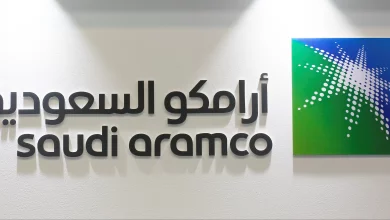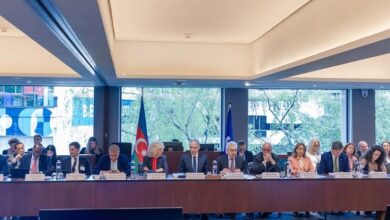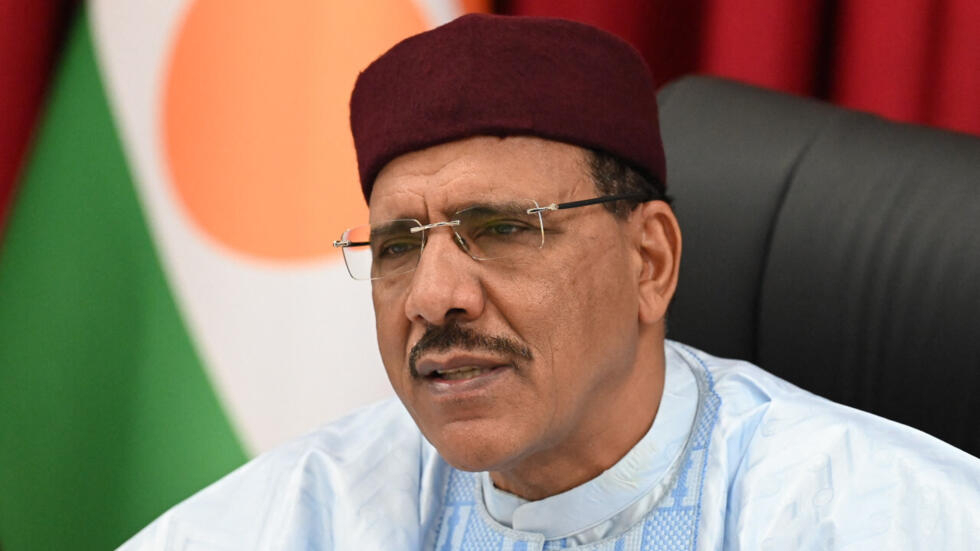First Saudi female astronaut reaches space station

By David Gritten
The first female Arab astronaut to go to space has arrived at the International Space Station (ISS).
Rayyanah Barnawi is one of two Saudis on Axiom Space’s second private mission, which took off on a SpaceX Falcon 9 rocket from the US on Sunday.
During her scheduled 10 days in orbit on the ISS, the 34-year-old biomedical scientist plans to carry out stem cell and breast cancer research.
She hopes to inspire women from all backgrounds in the Middle East.
In a video filmed in space before she reached the ISS, she said: “To the people around the world, the future is very bright. I would like you to dream big, believe in yourselves and believe in humanity.”
During their time on the orbiting laboratory the crew will conduct more than 20 science and technology experiments, including the repercussions of space on human health and rain-seeding technology.
Ms Barnawi’s experiments will be based on some of the work she has done over the past nine years as a research lab technician at the Stem Cell and Tissue Re-engineering Programme of King Faisal Specialist Hospital and Research Centre in Riyadh.
Rayyanah Barnawi said she was looking forward to sharing her experience in link-ups with children
At a recent news conference, she said that becoming the first female Saudi astronaut to go to space was “a great pleasure and honour that I’m very happy to carry”.
She also said she was looking forward to sharing her experience on board the ISS through video link-ups with children.
“Being able to see their faces when they see astronauts from their own region for the first time is very thrilling.”
Mishaal Ashemimry, a Saudi-American aerospace engineer and adviser to the Saudi Space Commission, said: “Our goals are to benefit all humanity through science.”
“We hope this mission will inspire girls from various backgrounds in order to advance the human experience.”
Women in Saudi Arabia only gained the right to drive in 2018, and human rights groups say male guardianship laws still limit women’s rights there.
Source BBC
First Saudi female astronaut reaches space station
By David Gritten
The first female Arab astronaut to go to space has arrived at the International Space Station (ISS).
Rayyanah Barnawi is one of two Saudis on Axiom Space’s second private mission, which took off on a SpaceX Falcon 9 rocket from the US on Sunday.
During her scheduled 10 days in orbit on the ISS, the 34-year-old biomedical scientist plans to carry out stem cell and breast cancer research.
She hopes to inspire women from all backgrounds in the Middle East.
In a video filmed in space before she reached the ISS, she said: “To the people around the world, the future is very bright. I would like you to dream big, believe in yourselves and believe in humanity.”
During their time on the orbiting laboratory the crew will conduct more than 20 science and technology experiments, including the repercussions of space on human health and rain-seeding technology.
Ms Barnawi’s experiments will be based on some of the work she has done over the past nine years as a research lab technician at the Stem Cell and Tissue Re-engineering Programme of King Faisal Specialist Hospital and Research Centre in Riyadh.
Rayyanah Barnawi said she was looking forward to sharing her experience in link-ups with children
At a recent news conference, she said that becoming the first female Saudi astronaut to go to space was “a great pleasure and honour that I’m very happy to carry”.
She also said she was looking forward to sharing her experience on board the ISS through video link-ups with children.
“Being able to see their faces when they see astronauts from their own region for the first time is very thrilling.”
Mishaal Ashemimry, a Saudi-American aerospace engineer and adviser to the Saudi Space Commission, said: “Our goals are to benefit all humanity through science.”
“We hope this mission will inspire girls from various backgrounds in order to advance the human experience.”
Women in Saudi Arabia only gained the right to drive in 2018, and human rights groups say male guardianship laws still limit women’s rights there.
Source BBC





